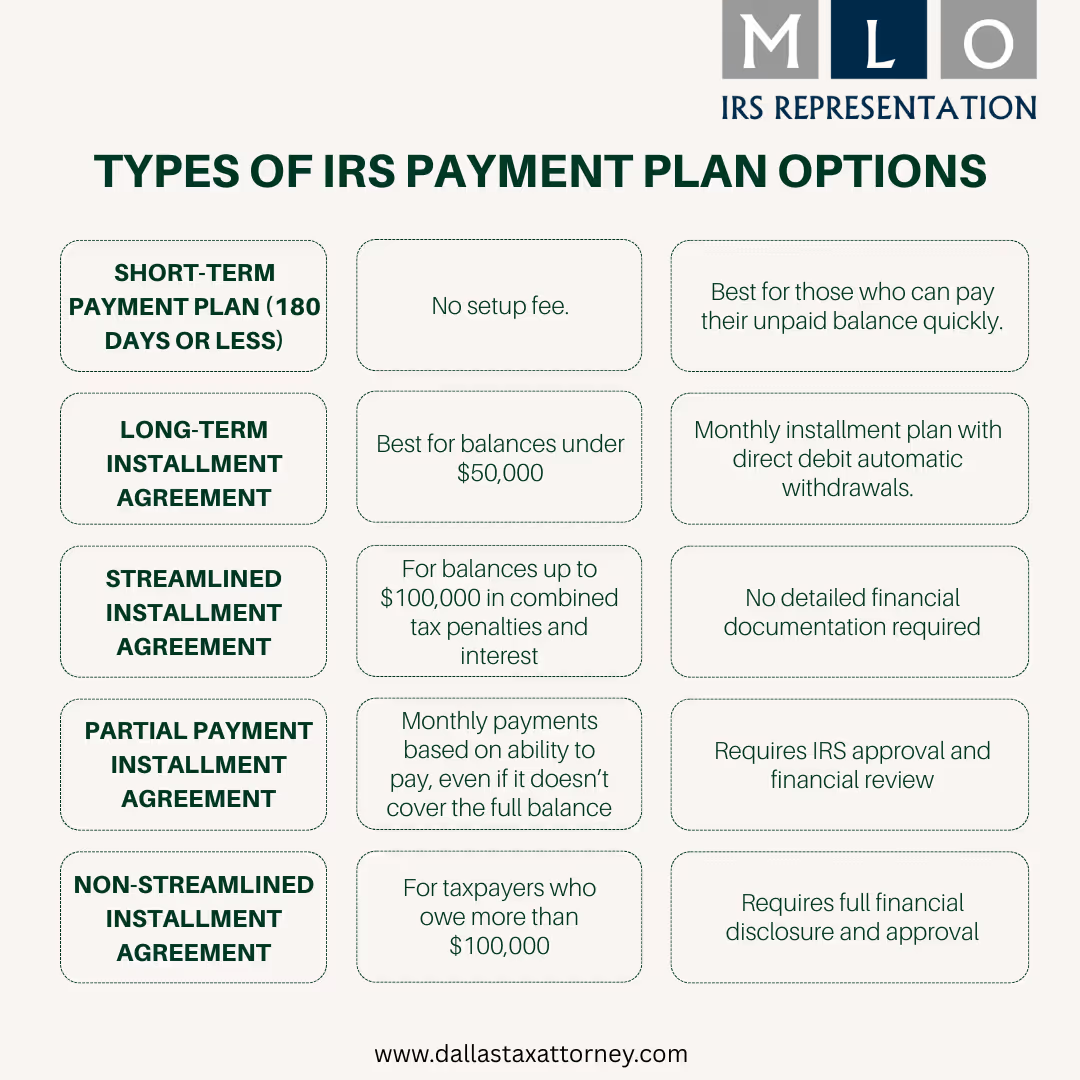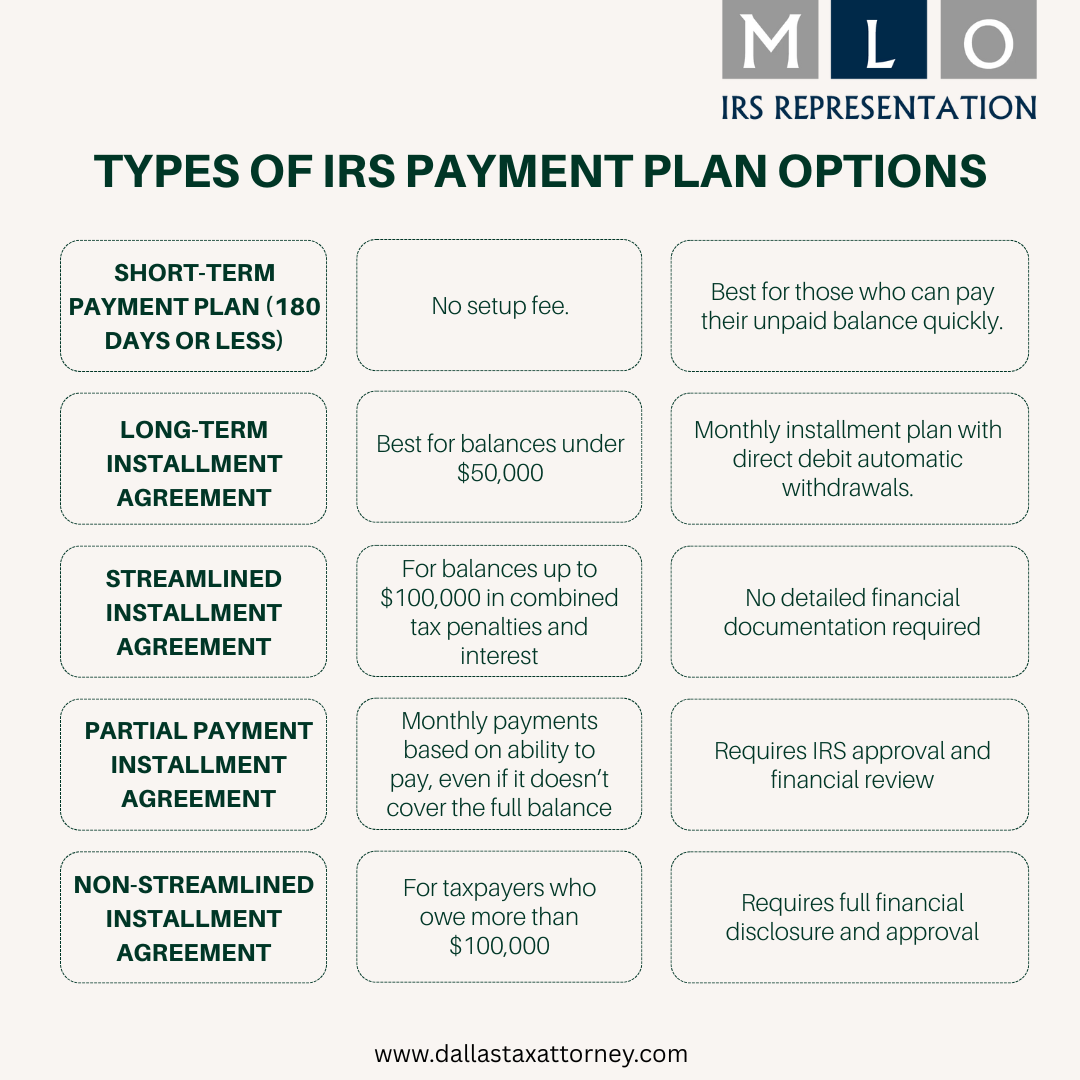IRS Installment Agreement: Pros and Cons for Dallas Taxpayers

Key Takeaways
- An IRS installment agreement is a powerful way to resolve tax debt through monthly payments.
- Interest and tax penalties will continue to accrue, increasing your total repayment.
- Taxpayers in Dallas, TX can access multiple payment plan options depending on their total balance and ability to pay.
- The IRS may require your banking information for direct debit setup.
- If you miss a payment, your agreement may go into default and trigger IRS collection actions.
If you owe back taxes and cannot pay the full unpaid balance, the IRS installment agreement might be your best solution. Many taxpayers in Dallas, TX turn to this payment plan to manage their tax liabilities through monthly payments.
But is an installment agreement right for everyone? In this guide, we walk you through the pros and cons, different payment plan options, and the necessary steps to request an installment agreement—including what to expect if you owe more than $100,000 in combined tax penalties and interest.
What Is an IRS Installment Agreement?
An IRS installment agreement is a formal payment plan that allows taxpayers to pay their tax debt over time, rather than all at once. If you’ve received a notice from the IRS regarding unpaid taxes, you may be eligible to submit an installment agreement request.
Depending on your situation, you can apply for an online payment plan or submit your form by mail. The type of agreement you qualify for depends on your total balance, monthly payment amount, and tax information.
Types of IRS Payment Plan Options
Choosing the right installment agreement often comes down to your ability to pay, how much you owe, and whether you want to handle the process yourself or work with a local professional.

Pros of an IRS Installment Agreement
1. Stops Aggressive IRS Collection Actions
Once your installment agreement is approved, the IRS generally stops wage garnishments, property seizures, and bank levies. This gives Dallas taxpayers the time and space needed to complete payments without added pressure.
2. Manageable Monthly Payments
The IRS allows you to determine a monthly payment amount that fits your budget. Whether you’re a homeowner in Highland Park or running a business in Deep Ellum, predictable monthly payments make budgeting easier.
3. Online Payment and Direct Debit Options
With the online payment plan, taxpayers can schedule direct debit automatic withdrawals directly from their banking information—avoiding missed payments and late fees.
4. No Prepayment Penalty
If you’re able to pay off your balance early, the IRS won’t charge a penalty. This can help reduce the total interest and penalties that accrue over time.
Cons of an Installment Agreement
1. Accrued Penalties and Interest
Even with an active payment plan, tax penalties and interest continue to accumulate on your unpaid balance. Over time, this can significantly increase the total amount you’ll need to pay.
2. Risk of Default
If you miss a monthly payment or fail to stay current with future tax returns, your installment agreement can go into default. The IRS may resume collections immediately.
3. Federal Tax Liens
For large debts, the IRS may file a tax lien—even if you’re in a monthly installment plan. This can affect your credit and complicate home or business financing.
4. Complex Process for Higher Balances
If you owe more than $100,000 in combined tax, you’ll need to provide extensive financial documentation to support your installment agreement request. Having a tax professional in Dallas, TX can be invaluable.
IRS Installment Plan Alternatives
If you don’t qualify or the installment agreement terms don’t suit you, consider these alternatives:
1. Offer in Compromise (OIC)
Settle your unpaid balance for less than you owe if you can prove inability to pay. The IRS reviews your financial situation before approval. Though the process can take time, an accepted Offer-in-compromise can reduce your tax debt significantly.
2. Currently Not Collectible (CNC)
Delay collection if facing financial hardship. Interest continues, but payments are paused until your situation improves. Collection actions are temporarily suspended during CNC status.
3. Innocent Spouse Relief
If your spouse is responsible for the tax debt, you may qualify for relief. This protects you from paying tax penalties and interest caused by your spouse’s errors on joint returns.
4. Professional Help
Working with a Dallas tax resolution firm helps ensure compliance and maximizes relief options. Experts can assist with documentation, negotiations, and choosing the best solution for your situation.
Final Thoughts: Take Action Today
If you owe taxes and can’t pay in full, an IRS installment agreement offers a structured, manageable solution. For Dallas residents, this could mean the difference between continued financial strain and a clear path to freedom.
Tax problems don’t disappear on their own. The earlier you set up your payment plan, the more you can minimize growing interest, avoid default, and protect your income.
Resolve Your IRS Installment Agreement with Margolies Law Office
Trust Margolies Law Office to guide you through the complexities of IRS installment agreements with expert advice and personalized solutions. Our skilled team is committed to protecting your rights and helping you achieve the best possible outcome.
Take control of your tax situation. Contact Margolies Law Office today for a consultation and start your path to financial relief.
FAQs
1. How do I submit an installment agreement request in Dallas, TX?
You can file an installment agreement request through the online payment plan portal at IRS.gov or by mail using Form 9465. A Dallas tax expert can help you complete and file the correct form.
2. What happens if I default on my IRS installment agreement?
If you default, the IRS can resume garnishments, liens, and asset seizures. They may also void your current agreement, requiring a new installment agreement request.
3. Can I set up automatic payments with the IRS?
Yes. The IRS encourages direct debit automatic withdrawals to avoid missed payments. You’ll need to provide banking information when applying for your monthly installment plan.
4. Will I still be charged interest and penalties during my payment plan?
Yes. The IRS continues to charge penalties and interest on your unpaid balance until it is fully paid off.

.webp)


%20-%20Copy.jpg)